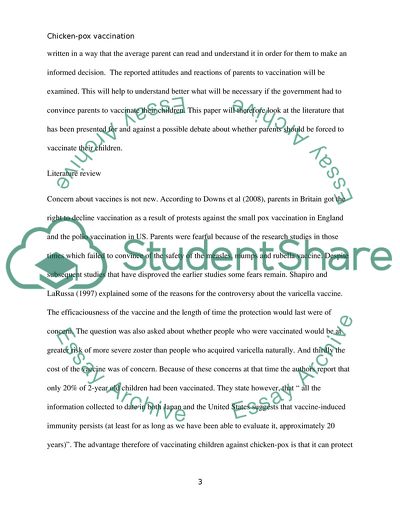Cite this document
(Chicken Pox Vaccination Controversy Essay Example | Topics and Well Written Essays - 1500 words, n.d.)
Chicken Pox Vaccination Controversy Essay Example | Topics and Well Written Essays - 1500 words. https://studentshare.org/health-sciences-medicine/1719266-chicken-pox-vaccination-controversy-should-government-force-parents-to-vaccinate-for-non-life-threatening-viruses-such-as-chicken-pox
Chicken Pox Vaccination Controversy Essay Example | Topics and Well Written Essays - 1500 words. https://studentshare.org/health-sciences-medicine/1719266-chicken-pox-vaccination-controversy-should-government-force-parents-to-vaccinate-for-non-life-threatening-viruses-such-as-chicken-pox
(Chicken Pox Vaccination Controversy Essay Example | Topics and Well Written Essays - 1500 Words)
Chicken Pox Vaccination Controversy Essay Example | Topics and Well Written Essays - 1500 Words. https://studentshare.org/health-sciences-medicine/1719266-chicken-pox-vaccination-controversy-should-government-force-parents-to-vaccinate-for-non-life-threatening-viruses-such-as-chicken-pox.
Chicken Pox Vaccination Controversy Essay Example | Topics and Well Written Essays - 1500 Words. https://studentshare.org/health-sciences-medicine/1719266-chicken-pox-vaccination-controversy-should-government-force-parents-to-vaccinate-for-non-life-threatening-viruses-such-as-chicken-pox.
“Chicken Pox Vaccination Controversy Essay Example | Topics and Well Written Essays - 1500 Words”. https://studentshare.org/health-sciences-medicine/1719266-chicken-pox-vaccination-controversy-should-government-force-parents-to-vaccinate-for-non-life-threatening-viruses-such-as-chicken-pox.


